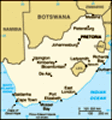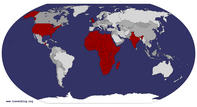Advertisement
Published: April 15th 2008
[youtube=5eyvGyCXRxU][youtube=lcrEdDXayBY][youtube=nbJOPX_7GuQ][youtube=18xElckwAoY]
THE GRAPES ARE IN,
IT’S TIME TO PARTY!
Her body moves like water shifting in slow motion. It’s elegant. She looks to have been transported into another plane. The powerful memory in every one of her muscles is overriding the Shiraz.
The band is amped up, and a unique form of Afrikaans dance music has the crowd moving, grooving, swaying. It’s contagious. How could I possibly describe it? A wild cross of American Country and Western, Reggae, and Polka? You listen and decide. I am being swept along in the flow of the Oesfees (Harvest Festival) for farm workers in the Franschhoek Valley at the Solms-Delta Vineyard.
Farm workers.
Let me stop here.
I’m afraid there is no direct translation of these English words, “farm worker,” for an American or a Brit. I suspect that the subtle meanings and implications of these words may be singularly South African. In a way, it’s like the word “township.” They are loaded.
For those of us who are not South African the words sound innocent, polite. For a South African, especially a black or coulored South African, they are charged with a violent history of
injustice. Excuse me, not a
history of injustice, but injustice, period. Include the present here please. Google “South African farm workers” and see what you get. It seems to me that the system of using “farm workers” in South Africa has been, and still is in certain cases, but a few degrees removed from indentured servitude. Cesar Chavez where are you?
There are farms, however, where owners are successfully trying to do the right thing. Solms-Delta is one of these farms.
"An innovative empowerment deal will transform employees on the three Franschhoek-based Solms properties into land owners after generations of tilling vineyards on which they had no claim," Paula Wilson, the spokesperson for the farms, was quoted as saying in the Mail & Guardian On-line.
"In terms of the deal,” she continued, “South African-born neuropsychologist Mark Solms and United Kingdom partner Richard Astor would transfer Deltameer into a trust owned by the farm workers."
Solms and Astor seem to be well-balanced characters, judging by this festival they put together. The party is free to the farm workers in the valley, with a limited number of tickets sold to the general public. It’s a true harvest festival,
what Mark Solms described as “an inclusive and authentic celebration of the harvest, and of the vernacular musical styles of the Cape winelands; a real thanksgiving.”
He ain’t lyin’. Back to the party.
The farm workers are all arriving in the back of trucks, or walking down the long entrance road to the farm. The music has already begun and people are lining up at the food tent waiting for women in aprons to spoon big servings of meat, curried rice, and smoked fish onto their plates. It’s authentic home cookin’. I can’t imagine being served anything differently if I were to land in a kitchen belonging to anyone of these folks. I wash it down with a couple of glasses of smooth shiraz.
The ground is covered with blue blankets. Picnic tables are crowded with folks enjoying the food and the wine. Some of the early oiled farm workers are already movin’ and groovin’, hip shaking and arm waving around large oak wine barrels. Kids run here and there in quick bursts, like bugs on the surface of a pond. They chase bubbles that float in tense exploding rainbows through the air. The farm workers look
so weathered; skin punished by the sun, faces tanned in an incredible display of color. It all talks of the demanding work they do, in conditions that can be brutal - relentless heat, long hours, backbreaking manual labor. They fill trailers high with mountains of ripe grapes, one after the other, and the tractors roll away as if there is no end to the bounty. It’s quite a picture for the uninitiated.
Mt first sighting was at least a month ago when I raised my index finger and pointed, as if I had spotted the most rare species of bird. The man on the tractor smiled widely, white teeth against a copper and furrowed face. The engine of his red Massey Ferguson was loud and wound-up, used rather to slow hard work, not this speedy jaunt where the ribbed tread of his tall back tires spun in a blur. He was pulling a huge trailer full of red grapes. A mountain of them, all glistening in the sun like fleshy luscious jewels. Had I ever seen more than a big bowl full? Perhaps, if you count the pale, fluorescently lit mound of them at the supermarket. That hardly looked
like bounty compared to this.
At the Oesfees the music never stops. One act seems to walk onto the stage before the previous one finishes. They include the Elginairs, the Hoosie Boois, Pieter van der Westhuizen, the Delta Optel Band (all who live and work on the Solms-Delta farm) and the four Papier brothers of Papier Langarm Orkies. And, as Mark Solms says, it
is “vernacular.” It doesn’t take long before I suspect that I’m experiencing something that is truly unique. This is not a huge event, which makes it even more special. Despite the fact that I cannot understand the lyrics, for it is all in Afrikaans, I am laughing and smiling from ear to ear. The crowd is joyous. No, ecstatic might be a better word. The mountains rise all around us, and they change color as the afternoon progresses. I feel very, very fortunate. The elegant dancer glides past me again, arms outstretched, a glass of wine in one hand, a cigarette in the other. Her eyes are closed in ruby rapture.
More and more people get up and dance as the mountains morph, a dusty pack of celebrants dancing around the stage with Mark
Solms in the middle of it all, tie askew, his shirt soaked with sweat, a smile as wide as wine barrel.
The highlight of the day for me is certainly Hannes Coetzee. It’s hard to tell just how old Hannes is, exactly. Maybe 60, maybe 70. Maybe he is younger, for there are many faces here that have aged prematurely. But it’s Hannes’ instrument that has me floored. He’s playing a guitar made from an old five-liter Castrol oilcan. It’s electrified, a wire running from the side of the can to an amp. Hannes looks like he’s about one volt away from electrocution. And it doesn’t stop there. He plays with a spoon. In his mouth! It’s the wildest slide guitar technique I have ever seen. He’s picking with his right hand, fretting with his left, and in between he is “spooning” the strings. The crowd is going crazy. When he sings, they all sing with him - “Dinah, lekker, lekker, Dinah.”
If I hear the word “lekker” once this afternoon I hear it a thousand times. It’s one of about seven words that I know in Afrikaans and it means “nice, or pleasing, or enjoyable.” It really
seems to be a signature word in Afrikaans, translatable and non-translatable at the same time. I think you have to experience “lekker” rather than read about it in a dictionary. I have done so. And so I say without hesitation that this party is definitely lekker.
Following Hannes Coetzee is David Framer and his band. He’s a white Afrikaner, about 60, a performer, playwright, who was asked by Astor to research the musical traditions of the area and come up with local talent. This guy is a complete character, dressed in a pork-pie hat, red leather shoes, a zebra skin guitar strap, striped vest, string tie. After the first song he motions to a women back stage that he’d like something to drink. I see him mouth the word “vodka.” She brings the bottle on stage and pours him about ten fingers into a big water glass. He’s strictly high intensity rock and roll, bringing in Chuck Berry moves, while his two back-up singers (dressed like church matrons) wail away next to him. His band is tight, tight, tight. The crowd is up and dancing, singing along. They know this guy. They know all the words. The sun is
going down, the stage lights come on, David Kramer and his band are now bathed in red and green light. If this isn’t lekker nothing is. Hannes joins him and starts to dance on stage with Kramer, butt to butt, legs swinging wildly in the night air. The crowd is pulsing, arms raised, smiling and laughing.
After Kramer does his encore I must slip away. Someone is waiting for me at the airport in Cape Town. The mountains have a wash of red light on them now. I am still smiling, laughing out loud actually, because I am certain that what I have just experienced might be the highlight of my year in South Africa. Someone grabs my shoulder tightly in an expression of brotherhood as they pass by. A second small man ricochets off me. He’s as relaxed as a pillow, laughing, dancing, smiling a toothless grin as he floats away. He’s lit. So lit.
“Lekker,” I say.
“Lekker, lekker,” he says back, and his face explodes into a craze of brown wrinkles as he is swallowed by the crowd.
Paste this addressinto your browser to learn more about South African farm workers:
http://www.nlsa.ac.za/NLSA/News/exhibitions-galleries/voices-photographic-exhibition
Also, some YouTube connections if the direct video link in Travel Blog does not work!!!
Advertisement
Tot: 0.081s; Tpl: 0.011s; cc: 10; qc: 30; dbt: 0.022s; 1; m:domysql w:travelblog (10.17.0.13); sld: 1;
; mem: 1.1mb











